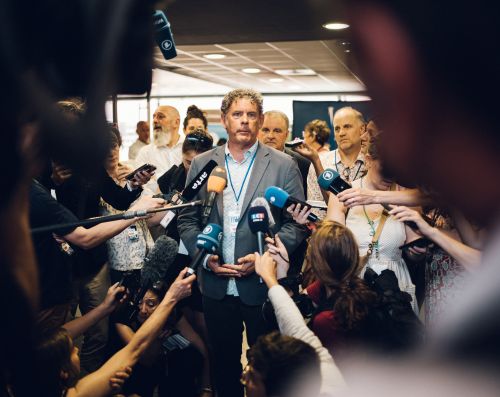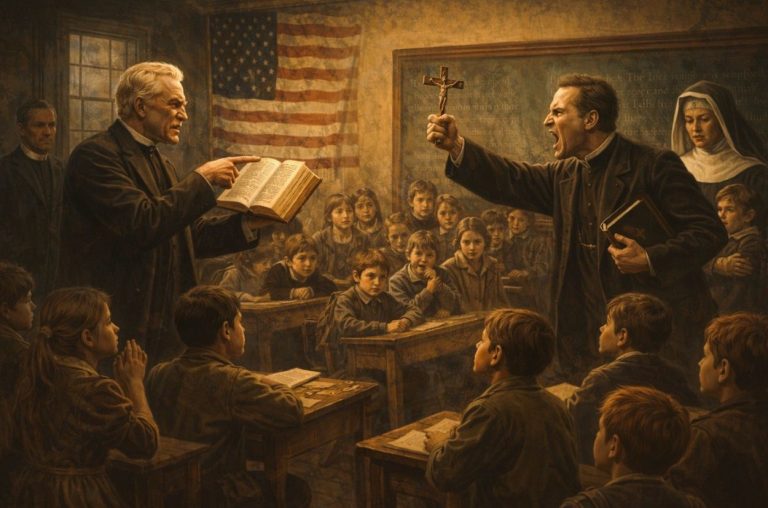

The intellectual flight from the U.S. is not a distant rip current: it may be the beginning of a powerful tidal shift in world academia.

By Matthew A. McIntosh
Public Historian
Brewminate
Introduction: A Tide Turns in Global Academia
In the corridors of elite universities and quiet terraces of reform-minded campuses, a migration quietly beginning is reshaping the academic map. Disillusioned by funding freezes, ideological constraints, and rising hostility toward intellectual freedom under the Trump administration, many American researchers are venturing toward Europe, where safe havens in the form of research grants and institutional sanctuary await.
Even as U.S. institutions once symbolized an intellectual refuge, that narrative now feels tenuous to many. European universities, once the exodus destinations for scholars fleeing oppression, are now opening their arms to refugees of academic politics.
A Growing Exodus Rooted in Policy
Funding Cuts and Censorship Fuel Displacement
Academic freedom in the U.S. has already eroded under Trump’s second term. Institutions such as the NIH, NSF, and even the Smithsonian have seen layoffs and budget retrenchments. Terms like diversity and climate are increasingly off-limits in grant applications. One sociologist points to a wave of self-censorship and outright removal of scientific content online, all backed by a climate of uncertainty and political overreach.
A Nature survey confirms this unease: among U.S. scientists and Ph.D. students, roughly 75 percent consider leaving the country.
Europe Responds with “Scientific Asylum”
France and the European Commission have taken swift action. Aix-Marseille University established a “Safe Place for Science” initiative, offering three-year funded positions for displaced scholars. Within weeks, hundreds applied—from climate researchers to historians.
Beyond France, offers spread across the continent. The European Commission introduced a €500 million fund to attract global scientific talent. Germany’s Max Planck Society reported a threefold surge in U.S. applications, particularly from early-career women scientists. Belgium’s Vrije Universiteit Brussels and The Research Council of Norway also launched programs aimed at U.S. scholars.
Faces of a Disquieted Cohort
Real Stories Behind the Statistics
Among those affected is a historian who delayed returning from Marseille, fearing reprisals upon entry into the U.S. The “Safe Place for Science” program meant more than a paycheck; it symbolized survival, intellectual refuge, and reclaiming academic agency.
Another voice, an anonymous researcher known only as “Lisa,” expressed real fear of detention or deportation, even if speaking openly posed risk.
A Broader Intellectual Retreat
This isn’t isolated. The exodus may echo climate migration: not just about convenience, but survival of scholarship. Experts describe it as a once-in-a-century brain loss, and for Europe, a potential brain gain.
What Europe Offers, and What America Risks
Promise of Stability Amid Uncertainty
For European institutions, the opportunity is more than recruitment, it’s a statement of values. Programs align with a historic vision of academic sanctuary and that same spirit once seen when America welcomed European scholars fleeing authoritarianism.
Lower salaries are tempered by stronger social services. An increasingly volatile U.S. academic environment makes prestige less compelling when basic research or personal freedoms may vanish overnight.
Is Europe Ready for Long-Term Gain?
Concerns remain. Many European funding schemes are short-term. Some question whether they can scale into long-term, sustainable academic ecosystems. The broader competition is gaining ground, but Europe lags behind the U.S. in sheer investment and infrastructure.
Looking Forward: A Quiet Shift With Broad Consequences
Institutional Continuity vs. Civic Loss
As scholars migrate, U.S. universities face greater precarity. Departments may shrink, dialogue will narrow, and mentorship pipelines could fray. Academic refugees bring talent and insight abroad, but their absence is felt. Domestic scholarship may become less diverse, less robust, and less free.
Political Lessons for the U.S.
If academic freedom is negotiable, what isn’t safe from political whim? The intellectual brain drain is a warning: when institutions become targets, they crumble. For democracy to thrive, universities must be untethered from political retrenchment, and policymakers must heed that lesson. The intellectual flight from the U.S. is not a distant rip current: it may be the beginning of a powerful tidal shift in world academia. Europe offers refuge, but for America, the imperative to rebuild trust in its own universities may be among the most urgent tasks of our time.
Originally published by Brewminate, 08.21.2025, under the terms of a Creative Commons Attribution-NonCommercial-NoDerivatives 4.0 International license.


